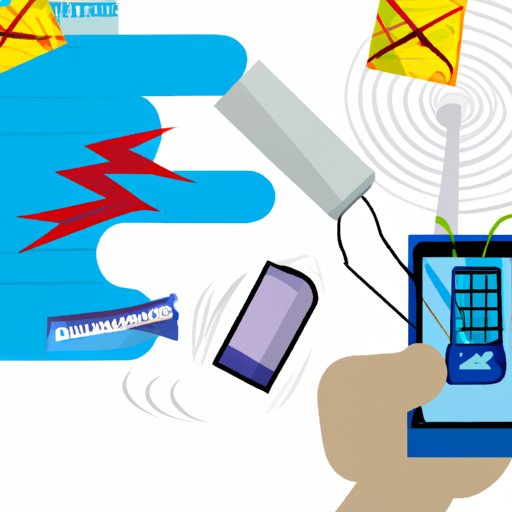Introduction
Having your phone tapped can be a terrifying experience. It means someone is listening in on your conversations, reading your text messages, and tracking your every move. But how do you know if you’re actually being tapped? In this article, we’ll explore the signs of phone tapping and provide actionable steps you can take to protect yourself.
Definition of a “Tapped” Phone
A tapped phone is one that has been monitored by a third party without the owner’s knowledge or consent. This can be done through a variety of methods, including installing spyware on the device, connecting it to a third-party recording device, or even tapping into the phone line itself. Once the phone is tapped, the third party can listen in on calls, read messages, and track the phone’s location.

Reasons Why Someone Might Tap Your Phone
There are several reasons why someone might tap your phone, ranging from malicious intent to simply wanting to monitor your activity. Some common reasons include:
- To monitor employee activity
- To spy on a partner or family member
- To steal sensitive data or financial information
- To gain access to contacts and personal information
- To harass or intimidate an individual

Check for Unusual Activity on Your Phone Bill
One of the first steps you can take to determine if your phone is tapped is to check your phone bill for any unusual activity. Depending on your carrier, you may be able to access your bill online or through an app. Look for any charges that don’t correspond with typical phone usage, such as international calls or premium services.

Listen for Strange Sounds During Calls
Another sign of phone tapping is the presence of strange sounds during calls. These could include clicking, static, buzzing, or other low-level noises. If you hear these sounds, it could indicate that your phone is tapped and someone is listening in on your conversation.
Unexplained Battery Drain
If your phone’s battery is draining faster than usual, it could be a sign that it’s being tapped. Spyware often runs in the background, which can cause your battery to deplete quickly. Additionally, if your phone is connected to a recording device, it could also be using up more battery power than normal.
Excessive Data Usage
Your phone’s data usage can also be a good indicator of whether or not it’s being tapped. If you notice that you’re using more data than usual, it could mean that someone is accessing your phone and downloading data from it. To check your data usage, go to your phone’s settings and look for the “Data Usage” option.
Unusual Text Messages
If you receive text messages containing strange characters or symbols, it could be a sign that someone is trying to access your phone. These messages are usually sent by automated programs, so it’s important to pay attention if you receive them. Additionally, if you receive text messages from unknown numbers, it could also be indicative of a potential phone tap.
Look for Suspicious Apps Installed on Your Phone
Spyware or other malicious apps can be installed on your phone without your knowledge. To check for these apps, go to your phone’s settings and look for any unfamiliar apps or programs. If you find any, it’s best to delete them immediately and run a virus scan on your device.
Conclusion
If you suspect that your phone is being tapped, it’s important to take action quickly. Checking your phone bill, listening for strange sounds during calls, monitoring your data usage, and looking for suspicious apps are all good ways to identify if your phone is being tapped. If you find anything suspicious, make sure to contact your carrier or local law enforcement immediately.
Resources
For more information on how to tell if your phone is tapped, check out these resources:
- How to Tell if Your Phone Is Tapped – Verizon Wireless
- How to tell if your phone is tapped – Tech Advisor
-
(Note: Is this article not meeting your expectations? Do you have knowledge or insights to share? Unlock new opportunities and expand your reach by joining our authors team. Click Registration to join us and share your expertise with our readers.)
